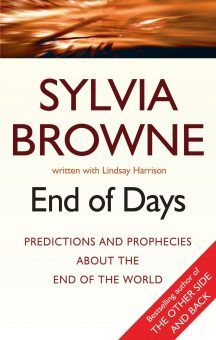Similarly, convenient and comforting as it can be to look out our windows and assume that if everything looks fine, everything must be fine, we’re doing ourselves a great disservice to ignore the problems we’ve created and that we must solve if life on Earth is going to continue into the next century.
For example, because we humans can get very busy being smug about our superiority and dominion on Earth, and our indestructability no matter how we abuse this planet, I think it’s worth paying at least a moment’s thought to an issue brought up in a fascinating article called “How Will the World End?” written by Herbert C. Fyfe for Pearson’s Magazine in July of 1900. In that article Mr. Fyfe points out:
Countless ages ago in the world’s past history there was a time when huge monsters, both on land and sea, were common. These reigned supreme for a time, only to succumb at length and disappear. Many species even within our own time have become extinct; can man then always hope to have the preeminence?
“When once a type is gone,” said the late Mr. J. F. Nesbit, “Nature never renews it. So infinite are her resources that no pattern, no number of patterns, matters. And it may be that man, a late arrival, is destined to a far shorter use of the earth than the cockroach or the lobster.”
Not over flattering to human vanity, but nevertheless true!
…
The fact is, we know little about the origin of diseases, and
why at certain seasons certain epidemics arise. The bacillus of plague, of influenza, of cholera, of typhoid, or any other disease propagated by germs, finds that the climatic or atmospheric conditions are favourable, and promptly proceeds to multiply, and, once it had a free run, it could destroy the entire human race in a month.
We might try to take comfort in the fact that this article was written more than a century ago, but it’s worth asking ourselves how much has changed on the points Mr. Fyfe is raising. We humans still absolutely believe we’re the most superior species on this planet, and I guess if “most superior” means “most destructive,” a case can be made. But isn’t it silly, really, that while we’re busy driving other species to extinction, we’ve overlooked the distinct possibility that we’re driving ourselves to extinction at the same time, with the same careless neglect and demolition of the very planet we rely on for survival? What has given us the impression that we’re not every bit as vulnerable, if not more so, as every other earthly species, especially when we look at the long list of fatal human diseases we can’t seem to conquer? And if correcting that misguided impression helps us to wake up and start paying serious attention to the well-being of this earth, then so much the better and God bless Mr. Fyfe.
Global Warming
I’m telling you this as a psychic, as a concerned citizen of the world, as an extensive traveler who’s personally seen 60-million-year-old glaciers melting off the Alaskan coast, and as a grandmother whose greatest wish is that my grandchildren’s grandchildren will be born on a planet in which they can thrive: global warming—the gradual, alarming increase in temperatures during the last century—is a potentially fatal threat to Earth. That’s a fact no matter how you feel about Al Gore, and no matter whether you’re a tree-hugging hippie or a right-wing conservative. And if we don’t take it seriously and do something about it today, it will become one of the primary factors in creating an uninhabitable world ninety-two years from now.
Pages: 1 2 3 4 5 6 7 8 9 10 11 12 13 14 15 16 17 18 19 20 21 22 23 24 25 26 27 28 29 30 31 32 33 34 35 36 37 38 39 40 41 42 43 44 45 46 47 48 49 50 51 52 53 54 55 56 57 58 59 60 61 62 63 64 65 66 67 68 69 70 71 72 73 74 75 76 77 78 79 80 81 82 83 84 85 86 87 88 89 90 91 92 93 94 95 96 97 98 99 100 101 102 103 104 105 106 107 108 109 110 111 112 113 114 115 116 117 118 119 120




